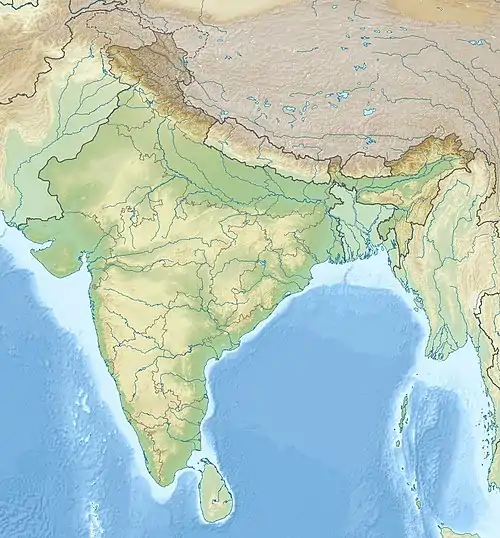Griddharaj Parvat
Griddharaj Parvat, which means "the hill of vultures" (also called Griddhakut Parvat, known locally as Giddhaila Pahar and known in English as Vulture Peak), is a hill of religious, archeological and ecological importance.
| Griddharaj Parvat | |
|---|---|
 Griddharaj Parvat | |
| Highest point | |
| Elevation | 717.5 m (2,354 ft) |
| Coordinates | 24°18′00″N 81°15′00″E |
It is situated near Devrajnagar village in the tehsil of Ramnagar, in the district of Satna and the state of Madhya Pradesh, in India. It is located 65 km south of Satna and 8 km from Ramnagar town. Its latitude and longitude are 24°18' North and 81°15' East. The altitude of the hill is 717.5 metres (2,354 ft). The hill is situated between the Kaimur Range to the north and the Maikal Hills to the south.
The place is of archeological importance. There are four caves on the hill in which rock paintings and mural paintings are visible.
An annual fair is organized every year in the month of Magha on the occasion of Vasanta Panchami. Thousands of people come and take a dip in the Ganges River.
Habitat of vultures
Griddharaj Parvat is a unique habitat for vultures not only in India but the world. Vultures numbering thousands can be seen in the crevices of the hill rocks. The vulture species seen here are the Indian vulture (Gyps indicus) and the White-rumped vulture (Gyps bengalensis). It is also the habitat of number of other wild animals.
In Hindu mythology
Griddharaj Parvat is of great religious importance in Hindu mythology. It has been mentioned in Skanda Purana as "Griddhanchala Parvata" (page 208). It is believed to be the birthplace of Sampati, the brother of Griddharaja Jatayu mentioned in Ramayana. The poet Kalidasa mentions this place as the most sacred in his book "Griddharaja Mahatmya" (Narada Uvacha) in the Sanskrit language. He wrote that a dip in the Manasi Ganga River originating from Griddharaj Parvat, at an altitude of 2354 feet, is a saviour of all kinds of sins. The sons of Brahma and the Goddess Parvati first saw this hill. It is mentioned in Shiva Samhita (Chapter 19-Bhugola Varnana).
References
- Jitan Singh Diwan, Kothi State, 1907: Rewa Rajya Darpan
- Kalidasa : Griddharaja Mahatmya (Narada Uvacha)
- Shiva Samhita (Chapter 19-Bhoogol varnan)
- James Legge: A Record of Buddhist Kingdoms (Being an Account by the Chinese Monk Fa-Hien of his Travels in India and Ceylon (A.D. 399-414) in Search of the Buddhist Books of Discipline.)
